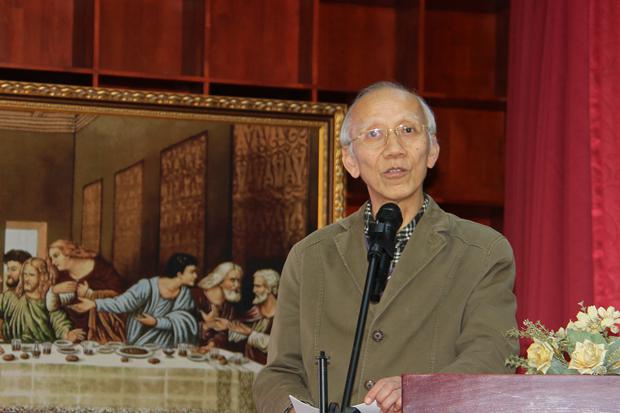The "Cross Removing" approach or campaign in Zhejiang province has been ongoing for one and half year. It should be corrected for five reasons: Administration should be under the law and the Constitution. The campaign in Zhejiang province should be considered as a large-scale administrative offense. Considering social stability, there is no reason to stimulate and hurt the feeling of a large number of people. When it comes to international influence, such campaign hurts the image of China internationally. From the world's religious, historical and cultural point of view, such incident indicated the leadership of Zhejiang province is narrow-sighted and ignorant. From policy-based and religious theory point of view, it was far away from the Marxist view of religion. A mild correction method to be considered is that the province amends the relevant regulations which are currently drafted. The new policy or regulations should be written and published to protect and restore the cross at places of worship. The more radical remedies should include compensation for the loss of property and personal injury.
Zhejiang Province in February last year began to dismantle the "illegal construction." It has been developed to specifically demolish church cross. So far, by using the police and other powerful means, the cross on around 1200 Christian and Catholic churches has been destroyed. It lasted a year and a half and still there is no termination (even the cross on the Christian Charity Hospital were dismantled). This campaign has been promoted from the urban to the countryside throughout the whole province, not like an exaggeration. During which threats and violence was applied, it causes extreme pressure and injury on the peaceful believers who resisted. It has been a very negative influence domestically and abroad.
We recommend that this practice or "movement" in Zhejiang province immediately be corrected for the following reasons:
According to the Constitution, this approach or movement is a large-scale administrative offense: violation of people's collective property, as it's in violation of the "Property Law"; violations of people's property and personal rights, for it's in violation of "Criminal Law"; violations of the faithful religious rights (observance of traditions, express beliefs, all religions equal), because it's in violation "of the Constitution." The development of administrative norms and setting up of new regulations after the fact to try to be found not guilty are actually offending the non-retroactivity principles. It is not constitutional legal principles.
In terms of social stability, this approach or movement is causing irritation and hurting a stable society. There has been a long history of Christian and Catholic religion in the province of Zhejiang. There are millions of disciples or believers in the province. Their feeling was hurt for no good reason. The provincial Catholic "two sessions" society and Christian associations have been founded for decades and both have been supporting the Chinese Communism party and the party's policies. It's their first public protest, as a visible reaction to this stimulation and injury. It is worthy of attention and reflection.For the aspect of international influence and national image, this approach is very negative. Zhejiang Christianity has a significant impact to the country and even the world (for example the largest Christian society is in Wenzhou over all the Chinese Christian associations around the world), therefore whatever the provincial government has done to the religious society, whether it is positive or negative, it will be spread throughout the world. Reacting to the protest of Catholic "two sessions" society, the provincial government confiscated the seal/stamps. That was announcing to the world that there is no religious freedom, and the Church is "government-run."
From the aspect of world religions, history and culture, this provincial government approach indicates they are narrow-minded and ignorant. The basic symbol of all the world's major religions are all related to its core value and history; Christianity and the Catholic cross, symbol-wise is no different than the Buddha to the Buddhism and the crescent to the Islamic. It's not an optional thing. In the contemporary world of many countries with cross on their national flags, what had happened in the province of Zhejiang made the approach be a laughing stock in the civilized world.
From the policy basis and Marxist-Leninist theory point of view, this approach or movement is far away from the theoretical foundation for the Party's religious policy, namely the Marxist view of religion. Marx, Engels and Lenin insisted that "secularism", so religion to become "citizen private business." Citizens will not have the different level of right because of different religious beliefs. They are repeatedly warned to be"cautious"and not to stimulate the religious sentiments of the masses, noting that "the religious war is a stupid move." These theories actually inherited the achievements of modern civilization of mankind. In modern politics, it has become a common knowledge.
In short, in order to implement the "rule of law" as major policy and eliminate ruling by just the will of governors, the practice of correcting such campaigns in Zhejiang Province is recommended. It can help to eliminate the consequences of the above aspects, and to change the bad result from this large-scale administrative offense into a positive declaration of governing by a nomocracy to the world.
In detail, the mildest practice can be substantially revised and published the relevant regulations which the provincial government of Zhejiang is currently seeking the voices on. The new regulations should include protecting the prescribed signs and religious expression rights. In fact, it will allow the church to restore the cross symbol. A more thorough approach should include compensation for losses relating to property and personal injury. Of course, the core leaders may also consider or apply other better way, for example, allowing the proceedings to achieve the correct purposes.
About the author: HE Guanghu, Professor of Renmin University of China, in the Religious teaching and research section. He is also the former director of the Department of Religious Studies, Institute of World Religions, Chinese Academy of Social Sciences.










